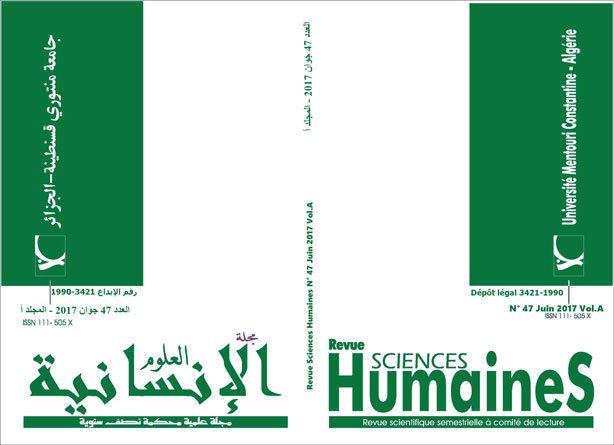Investigating the Effectiveness of Cognitive Vocabulary Strategy Instruction in Raising Learners’ Metacognitive Awareness for Long-Term Mass Lexis Learning
Mots-clés :
Investigating, Effectiveness, Cognitive Vocabulary, Strategy, Instruction, Raising, Learners, Metacognitive Awareness, Long-Term, Mass Lexis LearningRésumé
This paper reports on a study that investigates the role of learning vocabulary and the importance of intentionally instructing learners the techniques of vocabulary learning strategies. This study aimed at implementing a framework of Vocabulary Learning Strategies to enhance learners’ Metacognitive awareness resulting in maximizing their lexis repertoire. It investigates a causal relationship between the direct instruction of VLS and its impact on improving learners Metacognitive strategies towards; learning and retaining vocabulary. It is between the first variable; teaching learners how to learn vocabulary (through the means of Vocabulary Learning Strategies); in other words, the effect of Metacognitive strategy training and the impact of this instruction –the second variable- on raising their Metacognitive awareness to become autonomous and maximize their vocabulary repertoire; leading to the development of lexical knowledge and retention. Our field work consists of a questionnaire designed in accordance and in reliance with Schmidtt’s inventory of Vocabulary Learning Strategies. After gathering preliminary data from questionnaire analysis; a test is designed to serve the aim of spotting the VLS frequency use, and sum of strategies displayed. The test guides the construction of a step by step procedure to teach more elaborate strategies and enable learners become autonomous.
Téléchargements
Références
Aitchison, J.(2003). Words in the Mind. Oxford: Blackwell.
Anderson, N. J. (2002). The role of metacognition in second language teaching and learning. ERIC Digest. Education Resources Information Center.
Brown, A. L. (1987). Metacognition, executive control, self-regulation, and other more mysterious mechanisms. In F. E. Weinert & R. H. Kluwe (Eds.), Metacognition, motivation, and understanding (pp. 65-116). Hillsdale, New Jersey: Lawrence Erlbaum Associates.
Brown, H. D. (1994). Teaching by Principles: An Interactive Approach to Language Paedagogy. San Francisco: Prentice-Hall, Inc.
Brown, H. D. (2000). Principles of Language and Teaching, Fourth Edition. White Plain, NY: Pearson Education
Brown, H. D. (2001). Teaching by Principles: An Interactive Approach to Language Pedagogy. NY: Longman/ Pearson Education.
Cohen, A. (Ed.). (1998). Strategies in learning and using a second language. London: Longman.
Cohen, A. (Jan. 1999). Strategies in Learning and Using a Second Language. TESL-EJ, (3) 4.
Council of the European Union. (2001). Report from the Education Council to the European Council; the concrete future objectives of education and training systems. Brussels: Council of the European Union.
Ellis, R. (1994). The Study of Second Language Acquisition. Oxford: Oxford UniversityPress.
Flavell, J. H. (1976). Metacognitive aspects of problem solving. In L.B. Resnick (Ed.), The nature of intelligence. Hillsdale, NJ: Erlbaum.
Ghazal, L. (2007). Learning Vocabulary in EFL Contexts Through Vovabulary Learning Strategies. Novitas-Royal, 1(2), 84-91.
Harris, V. (Sep. 2003). Adapting Classroom-Based Strategy Instruction to a Distance Learning Context. TESL-EJ, (7) 2.
Hornby, A. (2000). Oxford Advance Learners’ dictionary of Current English. New York: Oxford University Press.
Liang, L. Z. (2010). A Study of English Vocabulary Learning Strategies for Non-English Majors in Independent College. Cross-Cultural Communication, (6) 4, 152-164.
Little, D. (1994). Autonomy in Language Learning; Some Theoretical and Practical Considerations. In Swarbrick, A. (Ed.), Teaching Modern Languages. London. The Open University/ Routledge.
Naiman, N., Frohlich, M., Stern, H. H. & Todesco, A. (1976). The good language learner. Research in Education Series No. 7. Toronto: The Ontario Institute for Studies in Education.
O’Mally. J. and Chamot, A. U. (1990). Learning Strategies in Second Language Acquisition. Cambridge: Cambridge University Press.
Oxford, R. (1990). Language Learning Strategies: What Every Teacher Should Know. Boston: Hinle & Hinle.
Rasekh Z. E. & Ranjbary R. (Sep. 2003). Metacognitive Strategy Training for Vocabulary Learning. TESL-EJ, (7) 2.
Richards, C. & Rodgers, T. (1985). Method: Approach, design and procedure. In Richards, C (Ed.). The Context of Language Teaching. Cambridge: Cambridge University Press.
Schmitt, N. (1997). Vocabulary learning strategies. In N. Schmitt, & M. McCarthy (Eds.), Vocabulary: Description, Acquisition and Pedagogy (pp.199-227). Cambridge: Cambridge University Press.
Stern, H. (1975). What can we learn from the Good Language Learner? Canadian Modern Language Review, 31, 304-18.
Takač, V. P. (2008). Vocabulary learning strategies and second language acquisition. Clevedon, UK: Multilingual Matters Ltd.
Taylor, L (1990). Teaching and Learning Vocabulary. Prentice Hal New York.
Thornbury, S. (2002). How to Teach Vocabulary. England: Longman.
Wenden, A. (1991). Learner Strategies for Learner Autonomy. Hemel Hempstead: Prentice Hall International (UK).
















